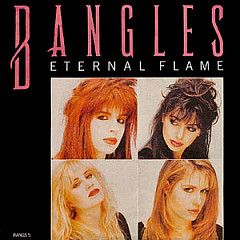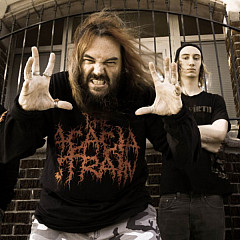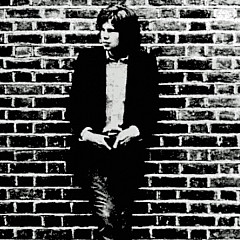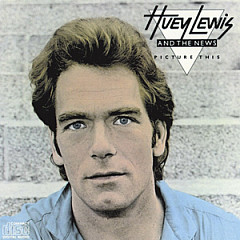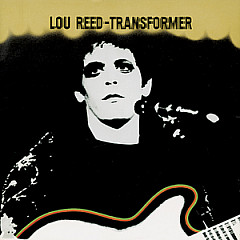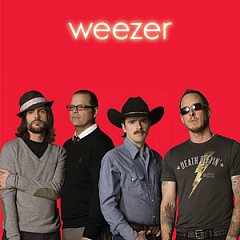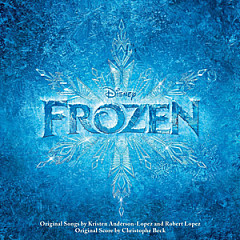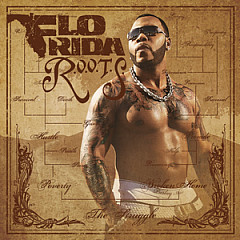 "The Freshman" is a tough song to have as your biggest hit, but Verve Pipe frontman Brian Vander Ark makes it work. A semi-true tale of overdose and abortion, it broke big in the summer of 1997, five years after the band formed. The soul-sucking promotion required to support the song took a toll, so they went in a different direction for their next album, a self-titled release known as "the frog album" because of the dissection diagram on the cover. "We felt like we were overexposed and exploited for the one song, so we were going to make a really artistic record," Vander Ark says. "It was released and nobody cared. It sold maybe 20,000 copies. Going from 2 million to 20,000 in a two-year period was a real slap in the face."
"The Freshman" is a tough song to have as your biggest hit, but Verve Pipe frontman Brian Vander Ark makes it work. A semi-true tale of overdose and abortion, it broke big in the summer of 1997, five years after the band formed. The soul-sucking promotion required to support the song took a toll, so they went in a different direction for their next album, a self-titled release known as "the frog album" because of the dissection diagram on the cover. "We felt like we were overexposed and exploited for the one song, so we were going to make a really artistic record," Vander Ark says. "It was released and nobody cared. It sold maybe 20,000 copies. Going from 2 million to 20,000 in a two-year period was a real slap in the face."Their next album, Underneath, had great songs but bad timing: It was released soon after 9/11, when there was little demand for new music. The band broke up, returning in 2009 to record a kids' song, which led to two albums of children's music. They've since released two more adult albums, Overboard (2014) and Parachute (2017).
The Verve Pipe never stopped performing "The Freshman." A funny thing happens when they play it: The crowd sings along and seems to return to wherever they were in that summer of '97 when it was all over the radio. The subject matter may be uncomfortable, but there's something communal and comforting about it. As Brian explains, an elegant expression of pain can be quite profound.
Brian Vander Ark: It wasn't necessarily a painful time for me because it's for the most part a made-up story, which most of my songs are. These are stories that I come up with, and I do characters. Part of the story was true in the fact that I had gone out with a girl and my buddy had gone out with her after I went out with her, and then I went out with her again and then she ended up getting pregnant and having an abortion. But from there, there's poetic license that happens and makes the story more dramatic. A neophyte writer that I was, I ended up having her commit suicide, and that never happened.
Songfacts: Did you know whose baby it was?
Vander Ark: No. And that alone would be where most of the pain would come from.
Songfacts: What is one of the Verve Pipe songs that is more about a moment in your life?
Vander Ark: I think the most autobiographical song that I've written is a song off of our album Overboard which is called "Carry On." That's probably the most autobiographical. It's just about where we stand and what we've done, and also where I'm going.
I've also written songs on my solo album, one of them called "I Don't Want To Be A Bother." That's about my Uber-Christian Reformed upbringing. But for the most part, these are just stories. I try to listen to people. I do a lot of house concerts and listen to people's stories and I'll try to put myself in as the protagonist. This is what I love. I love writing screenplays for that reason too, because I'm a storyteller.
Songfacts: What do you mean by your Uber-Christian Reformed upbringing?
Vander Ark: Well, Western Michigan is notorious for their Dutch community and the Dutch are very, very Christian Reformed people. We went to church twice on Sunday, once on Wednesday. We read the Bible before and after every meal. It's a ridiculous amount for any kid to handle, and once I let all that go and turned my back on it, that was the only time I felt like I had true fulfillment.
I also learned the advantages of travel. We were brought up to fear travel when I was a kid - you don't want to go outside of your little world here in your little community, you know? I think there's still people like that out there.
Songfacts: The songs you write tend to be very intimate. But did you ever try to write a stadium rocker?
 Vander Ark: Sure. Yeah. I enjoy that music too. I think "Cup Of Tea" is the most stadium rocker we have. That was meant to be big rock. Other than that, some of the stuff off the kids' records are that way. When we made the kids' records we set out to be as non-conventional for kids' music as possible with the four-part harmonies and the big stadium rock. We have a song called "My Principal Rocks" about a kid who goes to dinner with his parents and then in the lounge he notices that his principal is a drummer in a rock and roll band. He notices the tattoos and all of these other things and then later he finds out that his principal's band makes it and he sees them on TV and it's such a big moment for him. That's a really anthemic, rocking thing too.
Vander Ark: Sure. Yeah. I enjoy that music too. I think "Cup Of Tea" is the most stadium rocker we have. That was meant to be big rock. Other than that, some of the stuff off the kids' records are that way. When we made the kids' records we set out to be as non-conventional for kids' music as possible with the four-part harmonies and the big stadium rock. We have a song called "My Principal Rocks" about a kid who goes to dinner with his parents and then in the lounge he notices that his principal is a drummer in a rock and roll band. He notices the tattoos and all of these other things and then later he finds out that his principal's band makes it and he sees them on TV and it's such a big moment for him. That's a really anthemic, rocking thing too.Songfacts: Is it easier or harder to write a kids' song than a traditional song?
Vander Ark: It's harder. You have to be more clever, but you can't hide behind metaphors and ambiguity because kids wouldn't understand it [so no "shoe full of rice"]. You can pepper it with little nods that only parents will understand, which is always fun. I always use the example of the Shrek movies when Puss In Boots gets caught by the cops and the baggy falls out and he says, "It's not mine." You have those kinds of moments that parents can wink and nod and have a good laugh at, but those are harder to come by. At this point in my life it's easy to write just a regular song, but it's very difficult to write a kids' song.
And I'll tell you this: The kids' shows are much harder to play. Kids' shows are exhausting. You have to put on an entertaining show for 60 minutes straight and if you stare at your shoe or turn toward each other like a real rock and roll band would play, you lose them. And if you lose the kids you lose the parents. The parents are upset because their kids are bored and they want to go home. So we haven't done a kids' show in about a year and a half just for the fact that it's so exhausting. And we used to do two shows a day - we'd do a kids' show and then an adult show. I was very exhausting.
Songfacts: Being around kids in general is exhausting. That doesn't surprise me at all.
Vander Ark: Honestly, I feel like I'm around kids all day on the road.
Songfacts: Are there any themes that seem to show up over and over again when you write a song?
Vander Ark: Sure. Pain is something that's easier to write about than joy because so many songs have been written about love and joy that it's easier to write something painful and make it seem more unique. It's been a long time since I've heard a unique way to write an "I love you" song. With pain or bleakness or sorrow all the metaphors work and I think people get that.
A great example is "King Of Pain" by The Police - I love that. There are perfect metaphors in that and you know exactly what he's talking about. But then when you look at love songs, "God Only Knows," could there ever be a better love song written? So typically my themes are of a darker nature unless it's a kid thing, and the kids' songs are mostly about shenanigans or ways that I got in trouble when I was a kid.
Vander Ark: I did. I read the script and then I went to audition for the movie and I gave the director and the casting director a copy of the song. Then I left, kind of forgot about it, and a new script ended up on my doorstep with the name Rock Star on it - the first script was called Metal God. I'm reading it and in the back they printed my lyrics for "Colorful" in the script. I called my manager and said, "What's the hell's going on here? They stole my song." Well, they just failed to tell me that not only were they going to use the song but I got a part in the movie as well. But that was specifically written for that script.
Songfacts: But unsolicited.
Vander Ark: No, actually it was solicited. EMI at that time would send out a sheet of who needs what songs for this movie, for that movie and for this or that artist. And on that list happened to be this thing where they wanted a Seattle-esque ballad written for the movie, so I took a stab at it.
I get these breakdowns every six months or so that say what's coming out. It will tell me if someone like Katy Perry is making a new album and if they're accepting submissions.
Songfacts: In "Villains," there's a villain on the cover of every major magazine. Can you talk about that song and what was going on with those magazines?
Vander Ark: Yeah. That was specifically the Timothy McVeigh federal building bombing in Oklahoma. At that time when I started working on that song, I was working a day job. I'd get my coffee and pick up a magazine, but I'd have to get back to work before I could read it. So my point was, when his face is on the cover of all of these magazines, we would get distracted and didn't have time to read about the victims and feel that empathy for the victims. So the villain usually wins this kind of popularity contest, and for me that was a very sad state we were in, and we're still in it. In fact, we're probably in it worse now than ever.
Songfacts: What did you do when you were in the Army?
Vander Ark: I was in military intelligence. I worked the border of Czechoslovakia before the Wall came down in East Germany. Czechoslovakia was communist, so we'd work from the West Germany border and we would watch for any kind of activity going on over the course of an evening. We weren't at the border crossings, we were actually in the middle of a field where there was just a border stone every 50 meters or so. And then we'd just watch for anything going on. If there was a buildup of artillery coming from the other side, that's something you would want to call in. That kind of thing.
Songfacts: What years was that?
Vander Ark: It was 1983 to 1987. These were easy years to be in the military. I say that because I can't imagine doing it now. I met a guy last night, he was an Army Ranger home on leave from Afghanistan and he had to go back for another nine months. I really respect that. It's a whole different thing than when I was there. I was there in the Reagan years when nothing was really going on other than protests. You might get rocks or bottles thrown at the building you were in, but nothing like today.
Songfacts: How did your military experience play into songwriting and the rest of your job as a musician?
Vander Ark: It made me take it seriously and look at it more like it was something I had to do and had to get up for. Since the Army, I've been an early riser, a 4:30, 5:00 a.m. riser. You know, get up, have some coffee, do a quick workout and then sit and work diligently on a song. I usually have three or four songs going on at one time that have puzzle pieces that need to be filled in. So it's really discipline that I learned in the military.
Soon after they formed, The Verve Pipe learned there was a British band called The Verve that was quite popular over there. As luck would have it, The Verve broke through in America with "Bitter Sweet Symphony" a short time after "The Freshman" caught on. Ever since, Brian has been fielding questions about this. His Twitter profile states:
I sing for Verve Pipe. We had a hit - The Freshmen. Not Bittersweet Symphony which was The Verve, but wtf, I take credit for it sometimes.
We didn't ask Richard Ashcroft of The Verve about The Verve Pipe (that would not have gone well), so we didn't ask Brian about The Verve.
Vander Ark: Well, we weren't really a groupie kind of band. That kind of went out in the early '90s. Most of the shows we did drew a lot of the Patchouli-wearing, thoughtful girls, and we were thoughtful with them. There weren't many exploits - that really wasn't the MO in the '90s, at least as far as our band was concerned. And we hung out with the learned bands like Semisonic. I mean, those are Harvard graduates.
Songfacts: [Semisonic frontman] Dan Wilson is so straight cut.
Vander Ark: Hey, I love Dan, and you know, one of the guys in that group speaks Mandarin. Jacob Slichter wrote a book called So You Want To Be A Rock And Roll Star that kind of nails what it was like at that time.
 Songfacts: You have a song on Underneath called "Happiness Is" where happiness is where you find it, which is a really good mantra. And then of course everything goes to hell with 9/11 as soon as you release that song.
Songfacts: You have a song on Underneath called "Happiness Is" where happiness is where you find it, which is a really good mantra. And then of course everything goes to hell with 9/11 as soon as you release that song.Vander Ark: Yeah. But what I learned is, that song is not exclusive to the time it was released. We had some really terrific songs on that record and we had an opportunity to reach mega stardom again after the debacle of the frog album before it. We really had a great opportunity with the songs on that album to be singles, especially "Colorful," but life happens. And you know, worse things happened to people on 9/11.
That was just a turning point for us. I got the call probably two months after we thought we were going to be megastars again from RCA that they were going to drop us, and that's the bottom. That's when you've got to figure out what you're going to do, because you've got no more income coming in. We play those songs now and I can't help but think, Wow these are really fun, great songs and something we should feel proud of. They still have lessons that transcend whatever tragedy has happened, and people can still enjoy them. And we enjoy playing them.
Songfacts: What was going on that led you to write "Happiness Is"?
Vander Ark: That was actually written by Donny [Brown, Verve Pipe's original drummer]. I worked to hone the lyric but Donny Brown wrote "Happiness Is" and "Never Let You Down." I wrote "Underneath" and "Colorful." That album was pretty evenly split between the two of us. But I love that song. I thought the song should have been the first single off that record instead of "Never Let You Down," which I did not like.
Songfacts: Can you talk about your song "Photograph," which I think even preceded "The Freshman"?
Vander Ark: It did. "Photograph" was the first single. The idea behind the lyric was that you can freeze me in some way and I will stay that way for you forever. And meanwhile, I'm doing so many other things, and whether they're good things or bad things, your perception of my life is confined in that photograph.
We had a video treatment that came in for that that was pretty funny. The band was going to be in Chinatown and and we were going to come out of a factory down conveyor belts, each of us frozen in coffins and ice. Then when we reach the bottom, Chinese women come out to chop us out. We didn't choose that one, but conceptually that was pretty much what it was. The video director who wrote the treatment really got what the song was about.
Songfacts: What do you think of music videos?
Vander Ark: I love them. I'm a big fan of film and I was a big fan of Lawrence Carroll's art direction. He worked with Sam Bayer on Nirvana's "Smells Like Teen Spirit" and a few other ones - I think after us he did Counting Crows and Better Than Ezra and Jewel's video for "You Were Meant For Me." So I'm a big fan of the medium.
Songfacts: You did a rather cinematic video for "Overboard."
Songfacts: It's really well shot. Looks like it had a big budget.
Vander Ark: You know what? It was about 15K. He didn't take a fee. We had a small crew and we did it. That's a testament to him and his cinematographer. They were great, tireless workers for three days, on the set at four in the morning to catch the sunrise in the winter. It was freezing, but everybody got in the water. It was in Lake Superior, which was half frozen. His daughter Rory acted in it - she's the main girl. She's in that wedding dress on the ice for three days.
When somebody has a vision and it's their interpretation of my song, I just sit back and go, "Wow. This is somebody else's interpretation of what the song is about and it's beautiful." That's what's so wonderful about what we do: You can create something and put it out there and then somebody who has a different vision of what it is who's a tremendous artist can find something that's totally different and still make it gorgeous.
I wrote that with Jeff Daniels - Jeff and I worked on the story.
Songfacts: The song is set in Michigan, but is there a specific person who inspired it?
Vander Ark: No. The melody and the germ of the idea set the place. The chorus of the song is, "There's a girl in Michigan up in Lake Superior." That's all I had. I called up Jeff and said, "I got this melody and it's about a girl in Lake Superior. I don't know what she's doing up there, but I think it's a beautiful scene."
He said, "Well, maybe she's dead." That was the catalyst for us finishing the song. He ended up writing the first verse and then I wrote the chorus and second verse and it all came together nicely.
Songfacts: That sounds like the kind of songwriting interaction that only comes with familiarity.
Vander Ark: Yeah, I think so. I've had plenty of conversations with Jeff and I know he's a story guy. And I know if he doesn't like something he's not afraid to tell you, and typically he's right. We wrote an album together after that, and working on each other's stuff was a treat.
I collaborated with Andy Partridge years ago, which was amazing, but those are the only two real collaborations I think I've ever done outside of the band.
In 2007, Vander Ark was trying to figure out how to pay his mortgage when he hit on a daffy idea: play shows for fans at their homes. He put the offer on his website and got a huge response. Since then, every summer he's spent travelling the country performing at the most intimate of venues. It defies convention, but makes sense when he compares it to the alternative:
Club Gig: Between soundcheck, performance and getting paid, it's a 12-hour day. Drunk people talking. Bad air.
Backyard Concert: Show up, no soundcheck, play for an hour, crowd listens in rapt attention. Shake hands, pose for pictures, everyone buys some merch. Pack up and drive to the next one. Can bring the family.
Vander Ark: They want to talk about the process. They're so curious about the process, and that's why I wrote the meaning of "The Freshmen" on Songfacts a long time ago. How long has Songfacts been around?
Songfacts: Since 1999.
Vander Ark: Yeah, I got on there. You could probably look it up and see what my interpretation of the song was because I really love the site and and I wanted to contribute. I was tired of people asking me about it.
But you have a successful website because people are really curious about that process, and whenever I talk to people and I have more than the superfluous "how's the weather" conversations, they want to know what a song is about or what was the inspiration for it.
People are really curious, and unfortunately, we don't have all the answers. Everybody's got a different process. Some people wear their heart on their sleeve and some people, like me, make up stories because we love to spin yarns and find a clever way to do it.
Songfacts: We've noticed that many fans want to share their interpretations and also explain what a song means to them, like where they were when they first heard it.
Vander Ark: What I've learned in the 25-year span doing this is that you can't convince somebody, and you shouldn't try to convince somebody, of what your song is about if they don't want to believe it. That's because people hold these songs as personal statements about their own lives. They hear their life in every song, and you can't change people's minds. In the early days, I would get into arguments about what a song was about - my own song. But they're a curious bunch, my fans, and I love that.
January 25, 2018
Tour dates and more info at thevervepipe.com
Book a house concert at brianvanderark.com
photo (2), Jamie Geysbeek
Other interviews you might like:
Tony Scalzo of Fastball
Lisa Loeb
Chris O'Connor of Primitive Radio Gods
More Songwriter Interviews

